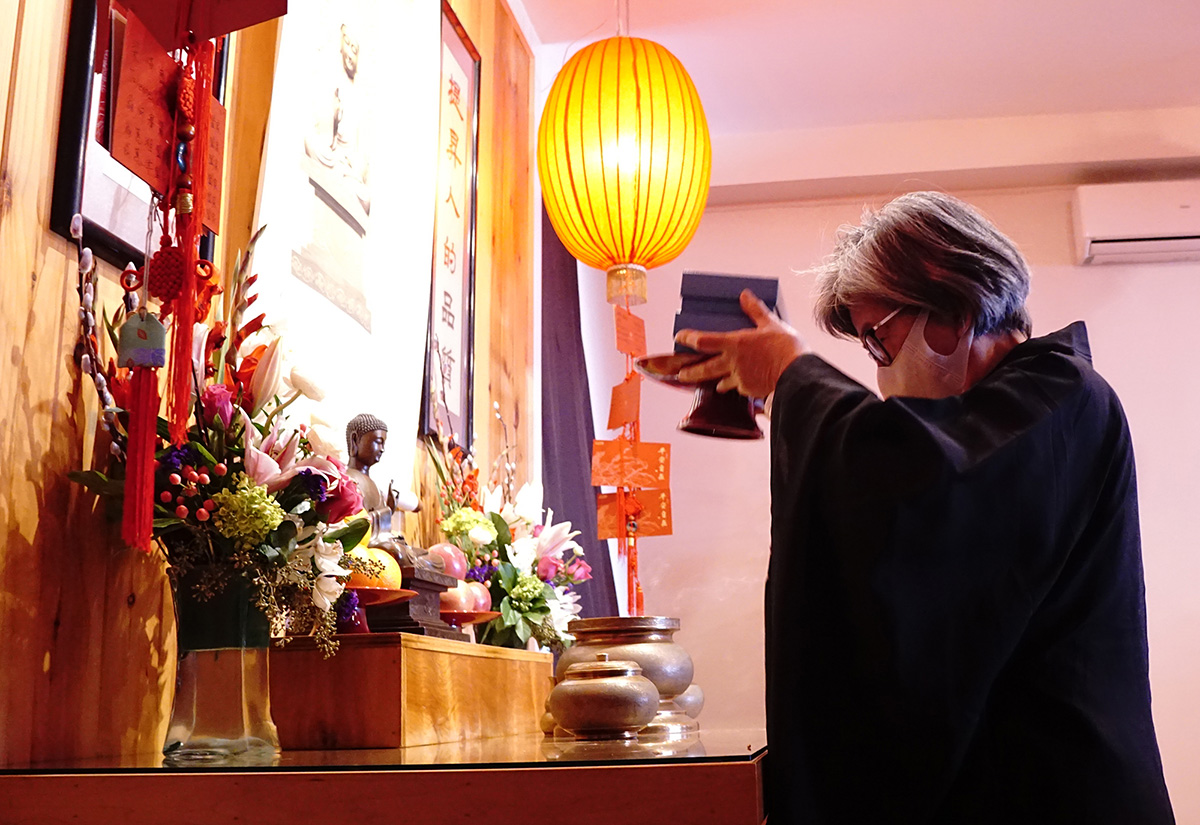
On Sunday, January 30, 2022, Chan Meditation Center hosted online a special chanting ceremony and Dharma talk in celebration of Chinese New Year. Before the ceremony, Ven. Chang Hwa, Director of CMC, greeted the audience with wishes for a happy and healthy new year and explained the significance of the chanting ceremony. According to Venerable, at Chinese Buddhist monasteries, on the first day of the Chinese New Year, there is a ceremony for general repentance through the recitation of Eighty-Eight Buddhas Repentance Ceremony and then a New Year talk and blessing given by the Abbot. Chinese New Year is like a reunion where the sangha gather to repent of actions committed in body, speech and mind in the past year and aspire to improve behavior in body, speech and mind in the coming new year.
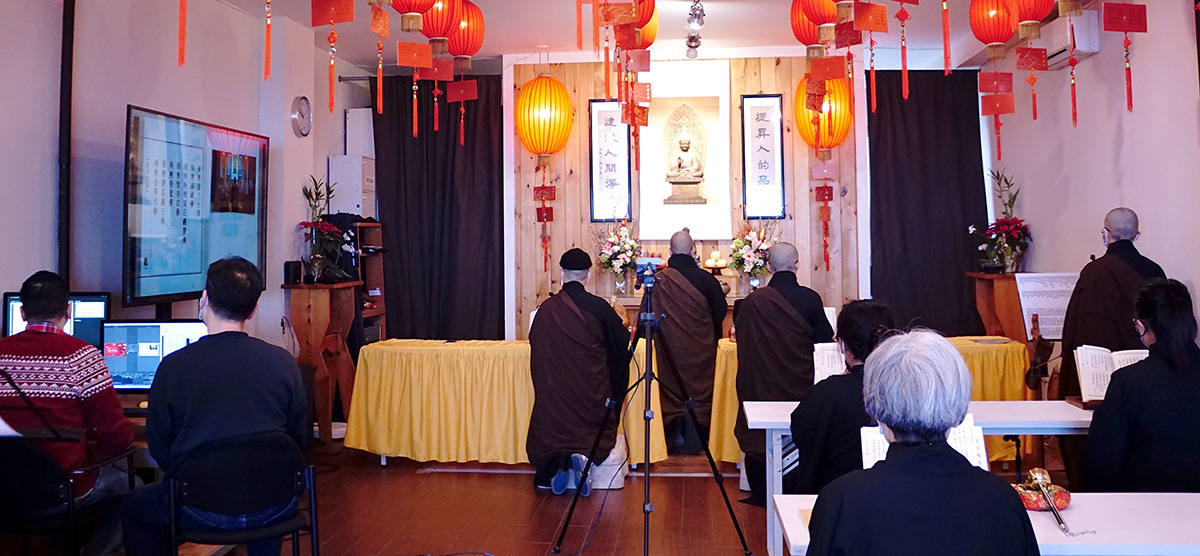
Venerable explained that in order to repent, we need to first understand ourselves. We need to observe our behavior in body, speech and mind in everyday life and improve ourselves. The Buddha taught that there are three types of practitioners– those who are prone to desire, those who are prone to hatred, and those who are prone to ignorance. Knowing what type of practitioner we are can help us to correct ourselves.
Generally, practitioners who are prone to desire tend to be sensitive to interpersonal relationships. They prefer elegance and beauty, good clothing, food that looks good, and expect people to speak in a way that is pleasant, not harmful or offensive. They may not be very rules oriented because pleasing others (or being pleased by others) is more important. Practitioners who are prone to hatred feel that things have to be done the right way, and tend to be logical and rules oriented. Practitioners who are prone to ignorance may not be clear about interpersonal relationships or doing things the right way. They do not get easily angry because they don’t understand the entire situation. They tend to follow the rules, and are quiet and peaceful.
Venerable shared how physical sickness and methods for treating illness are comparable to the initiation and alleviation of vexations. Those who are prone to desire may try to find the best way to be cured or the best type of medicine. Those who are prone to anger will get angry about getting sick and may even refuse to take medicine. Those who are prone to ignorance may take medicine without discerning which type of medicine works for them.
Venerable expects that 2022 will be a tough year with the ongoing pandemic, the economy, natural disasters, international politics and possible war. Venerable urged the audience to try to understand what type of practitioner they are, to observe their own behavior, to identify their sickness or problem, and find the right medicine to cure their vexations. Venerable thanked the volunteers for helping the sangha, taking care of the temple, and for helping to run our programs, and the sangha for leading the online programs, teaching, and taking care of each other.
I really enjoyed Venerable’s talk. Venerable’s explanation of repentance was pragmatic– we all make mistakes which we should observe and correct.
I was a bit hesitant about participating in the chanting portion of the program but was glad I did. The liturgy for the chanting has Chinese characters, Pinyin and English translation. As a non-Chinese speaker/reader, I am able to read the Pinyin and most of the English translation simultaneously. But during the ceremony, I focused more on the Pinyin and listened to the sound of the chanting without trying to understand its meaning. After the chanting ceremony, I felt light and happy and hopeful for the new year.
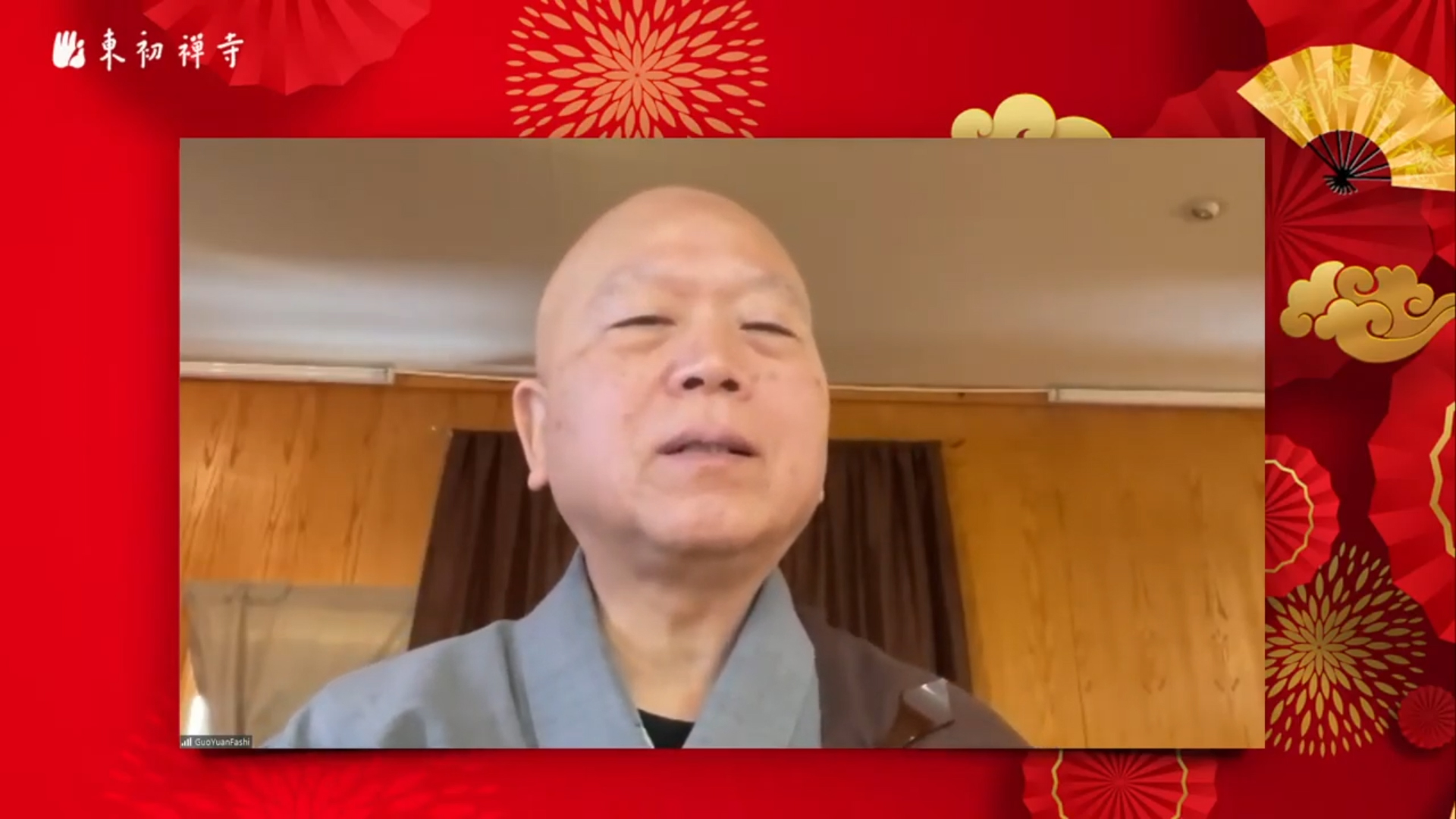
After a short intermission, Venerable Guo Yuan, Abbot of Dharma Drum Retreat Center, gave a lively nd inspiring Dharma talk entitled “Tiger” in celebration of the year of the tiger. Venerable Abbot talked about tigers within the context of Chinese culture. Since long ago and even today, the tiger represents vigor and fierceness. The Chinese have given the tiger the honorable title of “king of all animals” and believe that tigers have the power to protect and stabilize the family, dispel evil spirits, and protect children from sickness. Images and cutouts of tigers can be found in homes– on windows, cabinets and rice bins to dispel evil. During the Dragon Boat Festival, children wear vests with images of five animals representing the five poisons and a tiger at its center to dispel the poisons. Images of the tiger can be found in the food and medicine customs of Shaanxi, Sichuan and Hunan provinces. There is also the story of Xiang Yu, the great folk hero of the Chu-Han Contention period who is said to have been raised by tigers after being abandoned by his parents.
Venerable Abbot then told stories about tigers in relation to Buddhism. The last of the Eighteen Arhats known as the Subduer of Tigers was a monk who shared his food with tigers when they roared from hunger. Over time, the tigers became friendly and stay by the monk’s side, playing with him.
There is also a story about the 20th century Taiwanese master, Guang Qin. When Master Guang Qin was 43 years old, he practiced in a cave on Mount Qingyuan in Quanzhou in Fujian province. A tiger would come to the mouth of the cave and stand, swish its tail, and roar as if to say, Why are you in my cave? This is my cave– get out! The master was slender and had a small build but he was not afraid. He said to the tiger, Please don’t be mad at me! If you eat me, there would be no end to this cycle of killing. Let me stay and practice in the cave. When I become enlightened, I will come back and share my teachings with you. The master bestowed the Three Refuges to the tiger and the tiger roared and left. The tiger then came back with its family and they stayed and protected the cave. Master Guang Qin was hence known as the tiger taming monk.
There are a few stories of Master Xuyun (Empty Cloud) and tigers. When Master Xuyun was practicing in the Zhong Nan Mountains, there were many tigers, but the master was unafraid. The tigers stayed close to him and served as dharma protectors.
When Master Xuyun was 94 years old, he was at Nanhua monastery giving teachings on the Bodhisattva Precepts. Many people were in attendance. One day, the people saw flashing green lights coming closer and closer. Bewildered, they asked, What are these green lights? They were the eyes of a tiger reflecting light in the darkness! The people were panicked and yelled, A tiger is coming, a tiger is coming! During those times, there were many tigers in the mountains. Tigers would go to neighboring farms and eat the animals in the barns. But it was unusual for tigers to be near the monastery. Why was it coming to the monastery? The tiger was not fierce and seemed tame. It slowly walked to the altar where the master was teaching, gentle like a kitten. The people were still afraid because tigers are by nature fierce and felt doomed.
Among the audience was an official and his soldiers. The soldiers took out their guns to shoot the tiger. Master Xuyun said, Don’t shoot! The tiger is here to to listen to the Dharma and take refuge. The soldiers were dumbfounded and did not know whether to shoot or not. Now, Master Gwan Ben, Master Xuyun’s attendant, during his many years of service, had seen many miraculous happenings related to Master Xuyun. He recalled one time when a dragon came to a ceremony to receive precepts from the master. Master Gwan Ben believed that the tiger came to take refuge in the Three Jewels. He was afraid but wanted to protect his master, so he stood between the tiger the master and said, Don’t hurt my Master! If you are hungry, you can gnaw on my old bones but don’t eat my master! The tiger gave a loud roar and swished his tail. Master Gwan Ben broke out in a cold sweat, trembling. Master Xuyun said, Gwan Ben, the tiger does not like you. The tiger will not eat me. Master Xuyun stepped forward and walked closer to tiger. The tiger looked into his eyes and purred gently. Master Xuyun asked, Why are you here? Are you here to take refuge in the Buddha? The tiger kneeled on the stone steps in front of the Master. Everyone in the audience saw and were amazed, and chanted the Buddha’s name. The master continued, You came to seek refuge. This means that you understood something. Is it because you realize your past life? It is good that you have attained insight and understanding. I will transmit the Three Refuges to you. From now on, do not harm humans or animals. Practice vigorously so that you may someday attain the proper food of the Dharma.
As Master Xuyun bestowed the Three Refuges, the tiger knelt and listened attentively, silently as if it was receiving the Refuges. The master pet the tiger’s head and said, Lord of the mountain, you are such a good tiger, calm and gentle. I believe you will practice and attain Buddhahood. The tiger knows how humans and animals share the same bright Buddha nature. Between animals and humans, Buddha nature is all the same. Now return to the mountains and protect the mountains and the Dharma.
The tiger nodded and returned to the mountains. It kept looking back at Master Xuyun as if it did not want to leave. The audience witnessed all this and thought that the master had great spiritual power and recited the Buddha’s name. Master Xuyun said, I do not have power. This is all due to the power of the Buddha. From then on, every once in a while, a loud roar could be heard, and there were no more attacks from wild animals such as boars.
In another story documented by one of Master Xuyun’s attendants, the master was traveling and giving talks. One evening, after walking in the cold darkness, they found a cave to stay for the night. Because it was very cold, Master Xuyun and his attendant sat close to each other to keep warm, resting in a sitting position. The attendant felt something moving about next to them. This something felt soft and warm. He realized it was a tiger – not just one tiger, but many tigers! The attendant was afraid but the master said, Don’t be afraid. They are Dharma protectors. Stay calm, don’t be afraid.
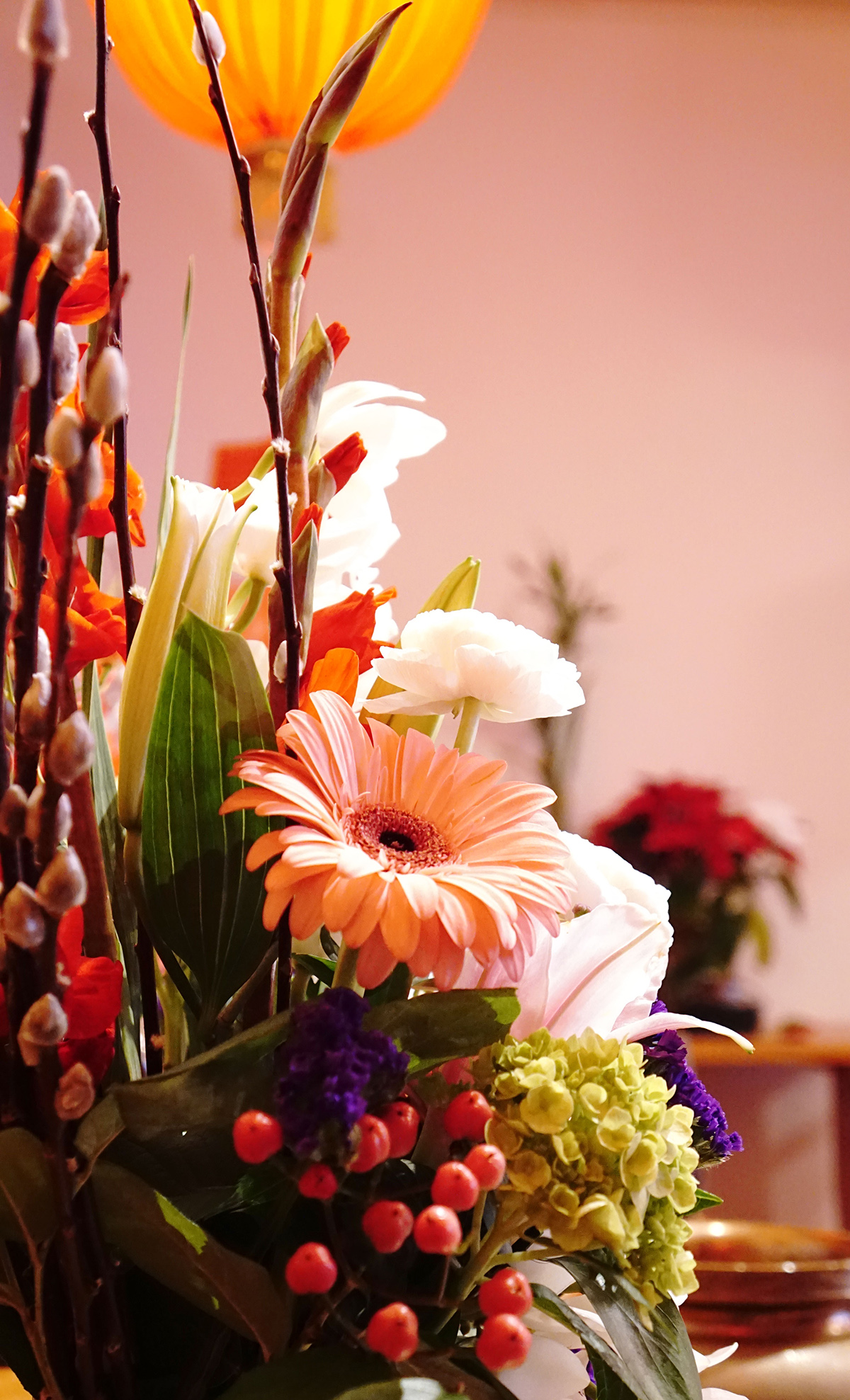
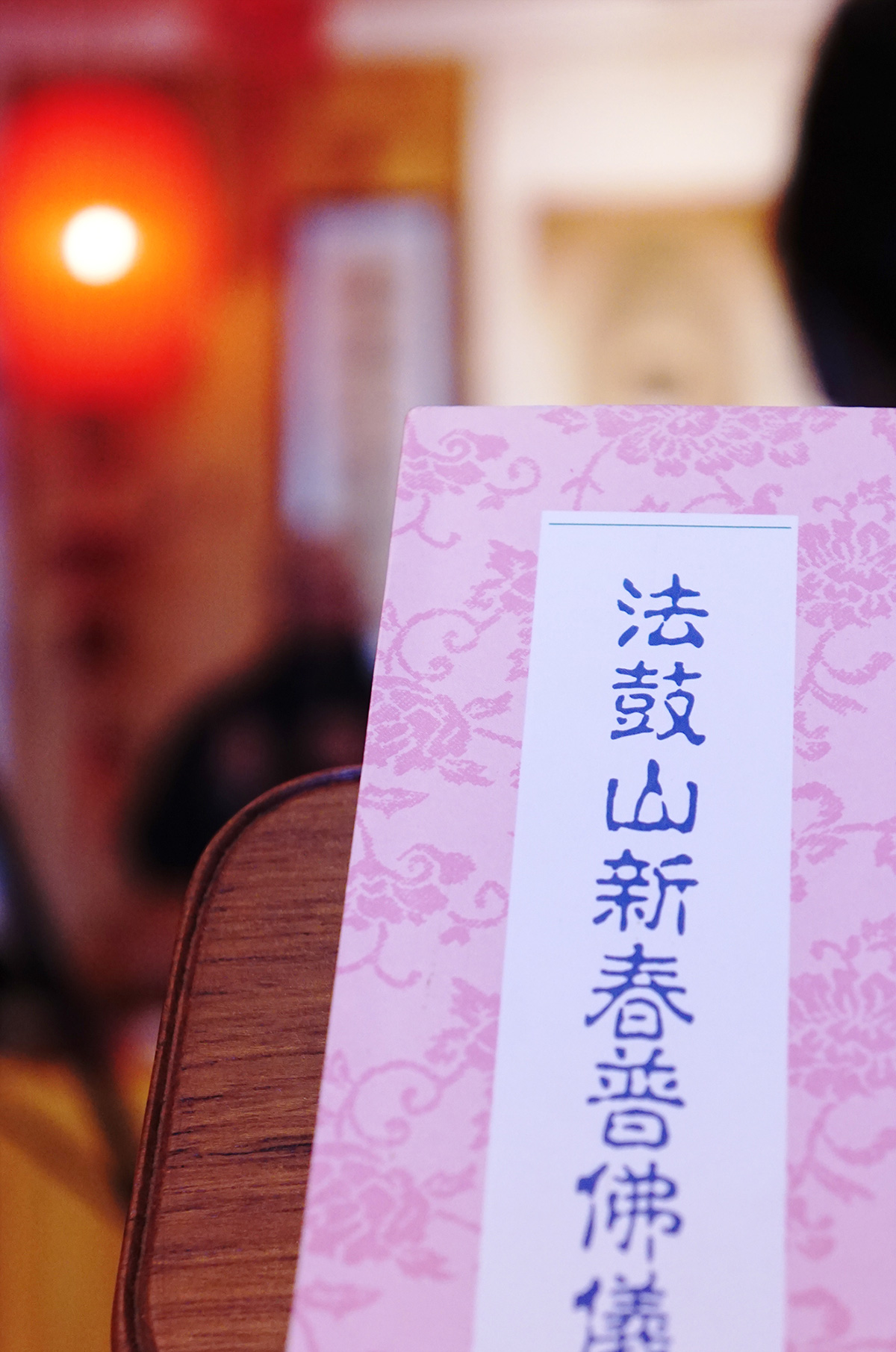
Ven. Abbot also talked about how the people of Indonesia believe that tigers only eat bad people and wondered if there some sense in this. How do tigers know who is good and who is bad? These days, as tigers are becoming extinct, some people are even raising tigers. But tigers are by nature fierce and wild and will harm even the people who feed them. So how do all these stories relate to us and our practice?
Ven. Abbot said that the nature of humans and tigers, whether fierce or mean, can be transformed. There is a saying: With just a thought of doing evil, we can create a lot of harm. One thought of doing good is the beginning of practice. Traditionally, in the lunar new year, people go the temple to repent of all the things they had done in the past year and to renew their vows through the Eighty-Eight Buddhas Repentance Ceremony. We should be rigorous and diligent like the tiger and practice in that manner. When we practice, we should try to emulate the tiger and be vigorous, courageous, and fearless in protecting the Buddhadharma. We should practice in reigning in our wild mind and protect the mind. We can aspire to constantly reflect on our behavior, speech and thoughts, to correspond with the Buddhadharma and the teachings of Master Sheng Yen, generate Bodhi mind, and create good affinities with people. Venerable Abbot concluded the talk with a reminder of this year’s slogan, Arouse the Great Bodhi Mind, and wishes for a smooth and peaceful new year.
